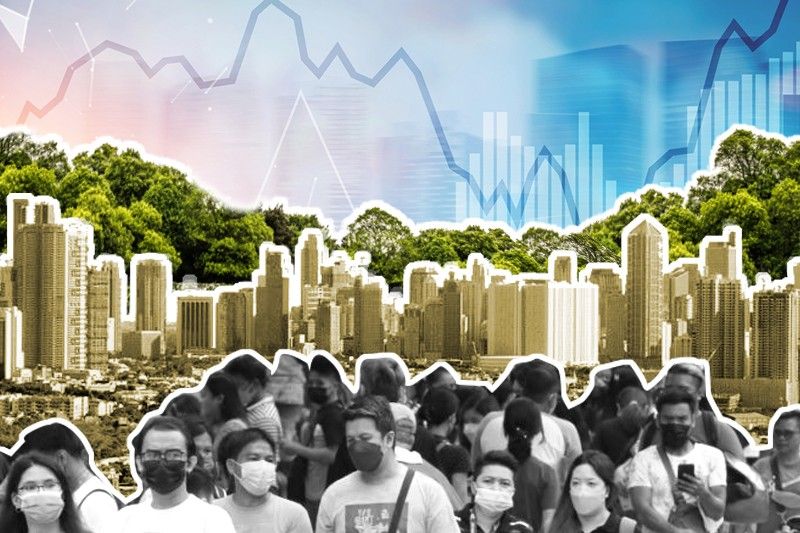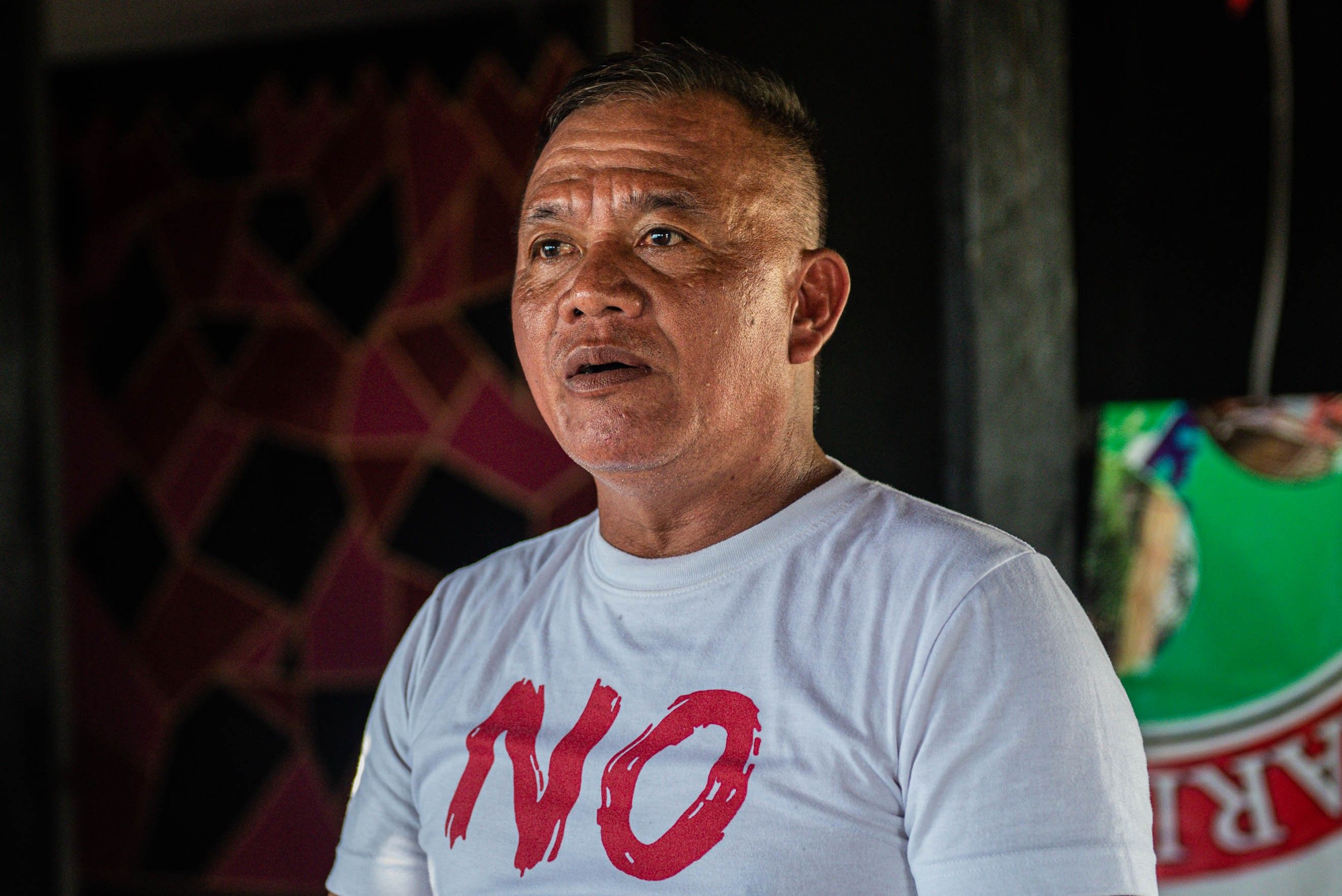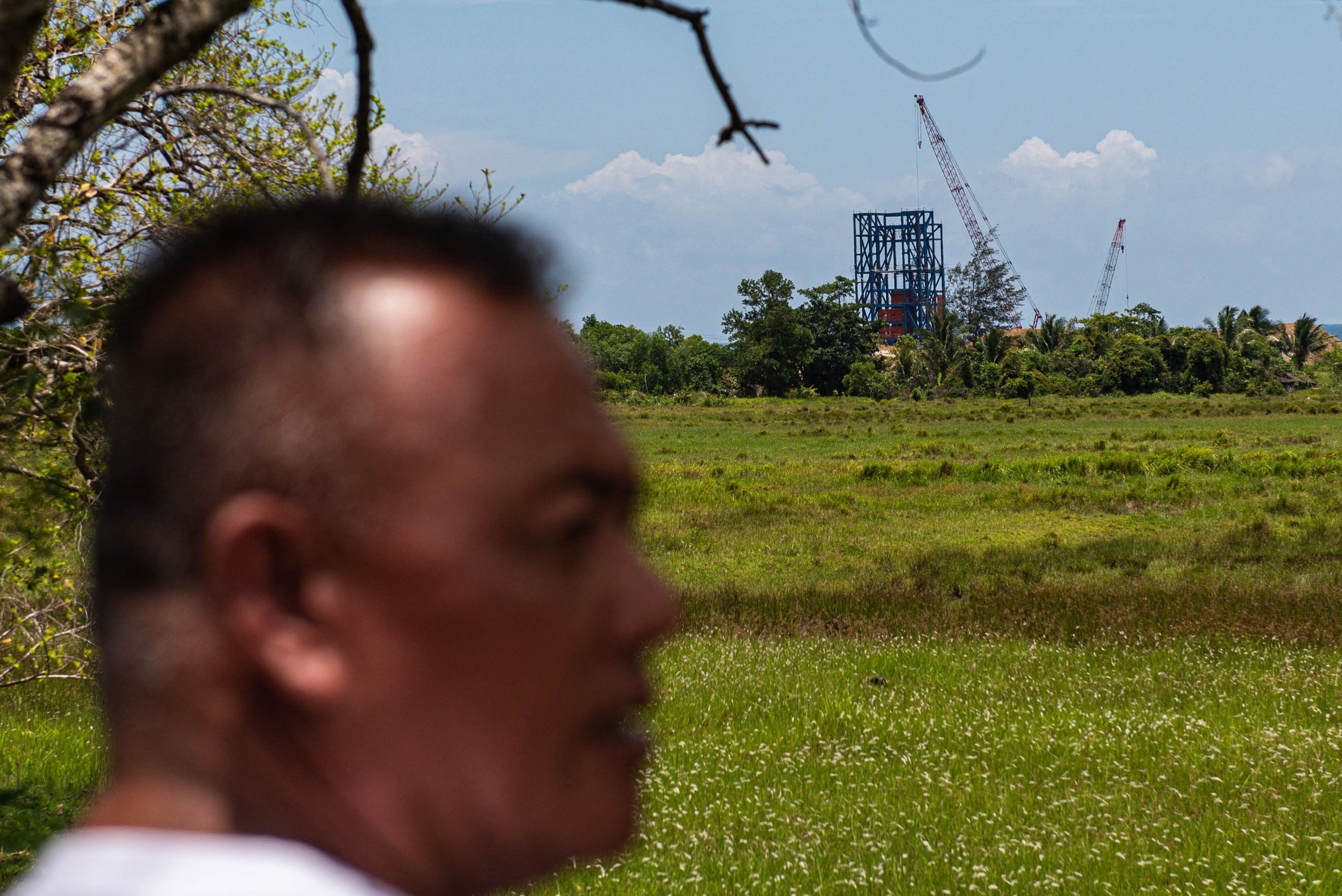For recovery’s sake, Philippines rescues ‘dirty’ companies from pandemic hole

Part 1 of a 2-part special report on the Philippines' lack of attention to 'green' recovery from the pandemic. Read the second part HERE.
Edited by Ian Nicolas Cigaral | Photos by Deejae Dumlao
MANILA, Philippines — Teofilo Tredez, a 55-year-old environmentalist and forest ranger, has won an onslaught of cases defending the environment, including trespass to dwelling and grave oral defamation.
He is again on the frontline of a new battle that has already reached court: stopping the construction of a new coal plant on the island province of Palawan, considered one of the world’s last ecological frontiers.
DMCI Power — the power unit of DMCI Holdings Inc., the business empire of the Consunji family whose business interests span mining, energy, real estate and infrastructure — is behind the construction of the coal plant in question. The project is located in the town of Narra, known as the rice granary of Palawan. DMCI is spending about P2.7 billion to construct the power plant.
"For farmers like me, the ash from the coal plant could contaminate our crops and make them unsafe for consumption. Also, there are fishermen in our town. The coal ash could pollute our sea," Tredez said in an interview together with other petitioners in a case against the coal project.
To get to Narra from Puerto Princesa, the provincial capital, is a two-hour drive along the countryside, where anyone who has journeyed there will attest to flitting in and out of scenes of farmland, beaches and mountains. The charm of driving there stays until the monolithic figure of the soon-to-be-completed coal plant comes into view.

The project is a brutalist monument to the aspirations of the Philippines to energize its entire archipelago. The country has so much potential to develop renewable energy, but coal is still widely regarded as the cheapest power source for developing economies.
When the pandemic spurred massive spending plans from the governments to salvage their economies, the Philippines, like any other country, found itself in an opportune time to initiate meaningful policies to embrace a green recovery of sorts. But while other economies have seized this chance, the Philippines, a country that is highly vulnerable to the effects of climate change, missed it.
Missing the ‘green recovery’ boat
When the health crisis hit in 2020, the Philippine government sealed off its borders and imposed harsh lockdowns that threw millions of Filipinos into joblessness and sent the economy to its worst crash on record.
Other countries also swiftly moved to blunt the economic pain from the pandemic. But there are nations that took their response to the next level after realizing one thing: the pandemic might not last long but the threat of climate change is very much present and its effects could be felt by the next generations.
Ripping up the fiscal rule books, other countries reached for the environmental reset button by inserting funds for sustainability projects and “green” policies in their stimulus packages. The Philippines, meanwhile, chose more of the same stimulus approach that did not pay attention to the environment.
Data from the United Nations showed that, in 2020, the Philippines was clustered with other nations that did not allocate funding for green recovery, such as South Africa, Thailand, Malaysia, Egypt, Saudi Arabia, Argentina, Portugal, Nigeria, Peru, Iraq, Mexico, and the Netherlands.
As it is, there were two “Bayanihan” laws that funded the country's coronavirus response at the onset of the health crisis. The Bayanihan to Heal as One (Bayanihan 1), or Republic Act 11469, was enacted in March 2020 to give former President Rodrigo Duterte direct power to realign and repurpose funds in the 2020 national budget. The law focused on replacing Filipinos’ incomes that were lost at the height of lockdowns, as well as spending on healthcare and aid for small businesses.
Documents from the budget department showed that out of P363.16 billion Bayanihan 1 funds that were actually spent as of 2021, the Department of Public Works and Highways (DPWH) and Department of Environment and Natural Resources (DENR) — two agencies that cornered a large share of climate change funds in the 2020 and 2021 national budgets — did not receive any amount from the stimulus law.
In fact, the DENR was among the agencies that had their 2020 budget reduced under Bayanihan 1. The DENR reported that its budget that year was slashed by P1.4 billion to help bankroll the state’s pandemic response. Meanwhile, the DPWH suffered the deepest budget cut in 2020.
When Bayanihan 1 expired in June 2020, its successor, RA 11494 or Bayanihan to Recover As One (Bayanihan 2), also allowed Duterte to move funds within the national outlay, but with a small augmentation of P140 billion in new funding.
But like its predecessor, Bayanihan 2 did not allot any funds for green projects. Notably, the Department of Transportation received P1.1 billion for a bike lane networks project which, the law said, was only meant to “provide the necessary infrastructure and support” for commuters, with no mention of any sustainability purpose of the project.
Bayanihan 2 allotted P2.8 billion for DPWH but mainly for its quick response fund in times of disasters and “rehabilitation of tourism roads”, not for any climate change programs.
"The Bayanihan laws financing the P616-billion response were largely budget realignments and did not constitute the fiscal stimulus the lockdown-choked economy so needed," Sonny Africa, executive director at IBON Foundation, a non-profit economic think tank, said.
"The magnitude of the Bayanihan laws was too small to meaningfully contribute to any recovery, much less a green recovery," he added.
Saving ‘dirty’ companies
Not only did the Philippines pass up an opportunity to lock in significant environmental gains during the pandemic, the country ended up helping companies that contribute to climate change for the sake of economic recovery.
Apart from the two Bayanihan laws, another hallmark piece of legislation passed a year after the pandemic ravaged the domestic economy was the Corporate Recovery and Tax Incentives for Enterprises (CREATE) law. This is a repackaged version of the Duterte administration proposals whose intentions can be traced back to the Ramos presidency. Back then, its earlier iteration sought to reform tax incentives that finance officials believed were "too generous" and were at the expense of state revenues.
The fight to get CREATE passed was not easy. In the Duterte administration alone, the measure was rehashed three times carrying different names like TRABAHO and CITIRA. What gave the bill a fresh wind at the time was the urgency cited by economic managers who touted the measure as a critical component of their stimulus to assist the economy’s rebound from the health crisis.
The recalibration of the old measures to CREATE meant the government became open to take an instant 5% cut in corporate income tax (CIT) rates to 25%, which was enforced retroactively to July 2020 after the law’s enactment in March 2021. Present tax perks, initially to be watered down quickly by the finance department under CITIRA, are maintained much longer under CREATE.
The idea is, with lower tax rates and steady incentives, higher earnings from corporates should drive companies to retain workers heavily battered by the health crisis. But this is also where the Duterte administration would come to the rescue of many corporations and conglomerates that have dirty power investments.
Data compiled by Philstar.com showed there were publicly-listed companies that have coal investments that posted higher earnings in 2021, the year financial results fully reflected the new CIT rates under CREATE.
The dataset only focused on publicly-listed companies because their financial statements are easily accessible. Three of these listed companies — Aboitiz Power Corp., AC Energy Corp. and San Miguel Corp. — already have a combined local market share of 47% in 2020, according to Statista, a data provider. Companies with interests in coal but did not declare nor recognize deferred tax assets in their annual financial statements were excluded from the data visualization.
In 2021, eight companies with coal in their power generation portfolio saw their earnings grow on an annual basis, with some firms even posting triple-digit bottom-line growth. Meanwhile, one company managed to narrow its losses while two firms returned to profits that year. However, SPC Power Corp., whose assets consist of diesel-fed and coal-fired generators, saw its net income dip 25.74% year-on-year in 2021 after damages to power facilities caused by Typhoon Odette sank the company to a net loss in the final quarter of last year.
Data compiled by Philstar.com also showed how the new CIT rates figured in these firms’ deferred tax assets, an item on a company's balance sheet that reduces its taxable income in the future. A firm typically reports deferred tax assets when it overpays its taxes. And since CREATE was only enacted in 2021 but the lower CIT rate was retroactively applied to July 2020, there are firms that might have had overpaid their taxes because the old CIT rate was still used in their 2020 financial statements. The companies can recover the overpayments through tax credits.
The movement in deferred tax assets varied across companies in 2020 and 2021. Notably, Aboitiz Power, AC Energy and San Miguel reported increases in their deferred tax assets.
Of course, there were other factors that contributed to the earnings growth of these publicly-listed companies. As the country emerged from harsh lockdowns, demand for energy recovered, boosting the revenues of power companies. Moreover, there were data distortions in the year-on-year corporate earnings because of the so-called “low base effects”, which magnified the growth numbers in 2021 because they were compared to figures in 2020, the year many businesses sank to losses and company earnings were extraordinarily low because of harsh lockdowns.
But overall, there are corporates in the Philippine Stock Exchange that recognized the benefits of CREATE, including DMCI Holdings, the parent of the power firm behind the upcoming coal plant in Palawan. In its financial statement, DMCI Holdings reported a one-off gain amounting to P955 million in 2021 that, the company said, mostly came from adjusted deferred tax because of CREATE.

Doing more
To be fair, enacting meaningful green policies has been a very hard task for many emerging economies compared to their developed counterparts, which have already reached the zenith of their industrial phase.
At the same time, transitioning to renewable energy sources, depending on who one asks, is either costly or requires great amount of political will.
For instance, industry titan Manuel V. Pangilinan — who has diversified interests in infrastructure, power, healthcare, water, and telcos in Southeast Asia — said on several accounts that the shift to sustainable and clean power could prove expensive, especially for corporations.
But this does not mean the Philippines is not doing anything. While the Philippines contributes only 0.3% to the global greenhouse gas emissions (GHG), the government said the country committed to reduce these emissions by 75% in 2030.
In 2020, the government announced it will no longer accept proposals to construct new coal power plants, a dramatic shift in energy policy that counts on declining costs of renewables to attract clean power investments. However, proposals for new coal projects that had had received environmental compliance certificates and permits from local government units prior to the announcement were exempted.
The coal moratorium was announced in tandem with the relaxation on foreign ownership limits in geothermal energy projects worth $50 million or more, doubling down on the slow transition to clean power seen as a long-term fix to the Philippines’ supply problems and now even sky-high power costs. Based on the energy department’s latest Philippine Energy Plan (PEP), the government wants renewables to comprise 35% of the country's generation mix by 2030 and 50% by 2040.
In 2020, renewables accounted for 21.2% of the Philippines’ power generation mix, according to data provider Statista.
READ: Philippines to ramp up clean power, but coal to remain king — Fitch unit
But Laurence Delina, assistant professor at the Division of Environment and Sustainability at the Hong Kong University of Science and Technology, believes the government could have done more to speed up the Philippines’ transition to renewable energy.
Delina — who studies environmental sustainability and just transitions, with particular focus on sustainable energy transitions — said legislators and policymakers should have taken advantage of CREATE by inserting provisions that would “levy taxes on coal and other fossil fuels. Then using the collected taxes to finance the energy transition.”
“CREATE should have been as a platform to accelerate the energy transition. Dirty energy should be priced properly,” Delina said in an interview.
PART 2: In the middle of pandemic, a battle to stop a coal plant in Palawan
--
This story was produced with support from Internews’ Earth Journalism Network
- Latest
- Trending
























